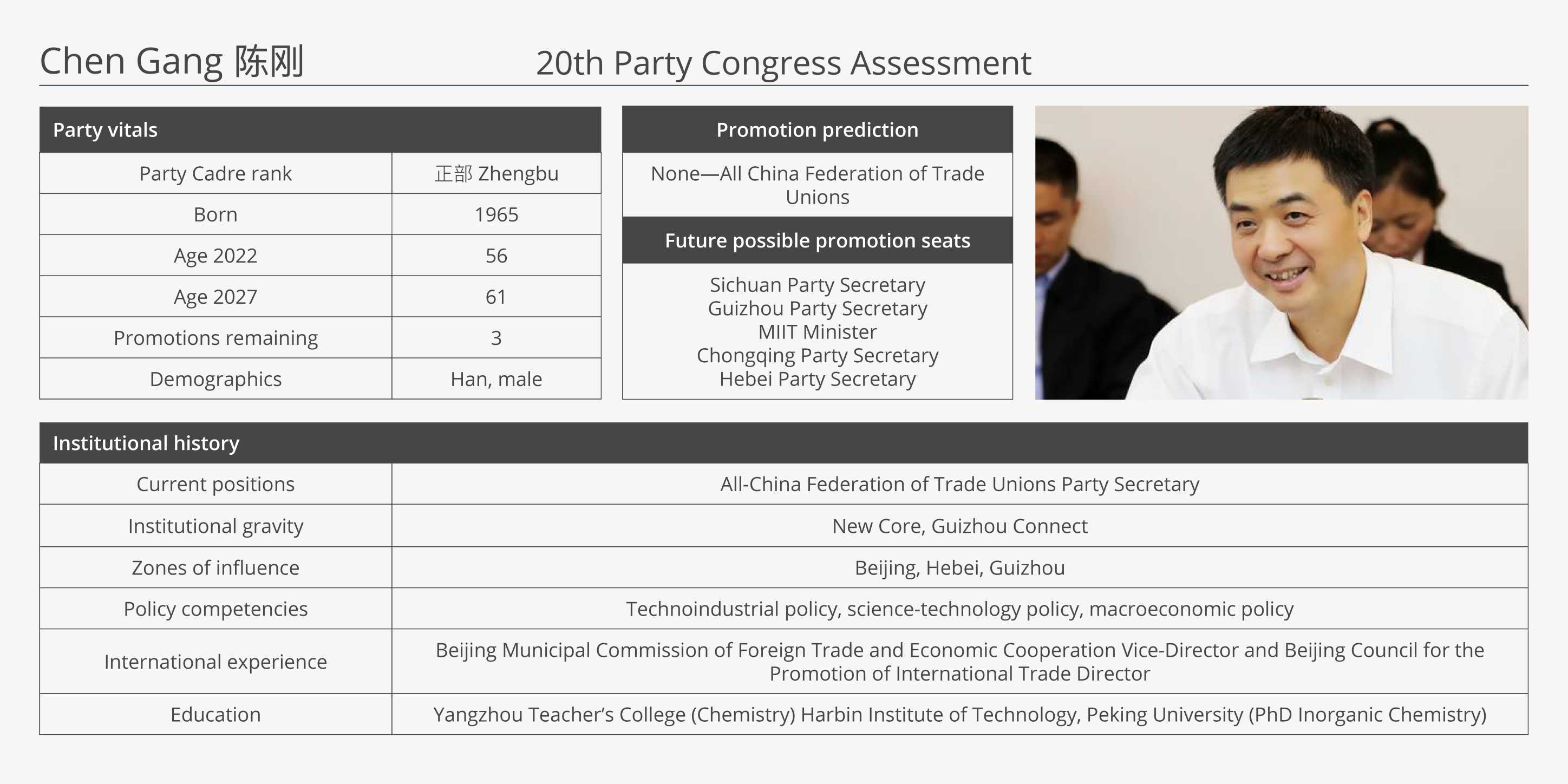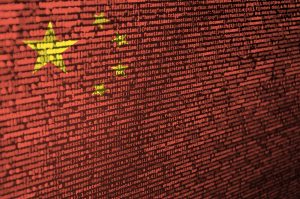In the 1990s and early 2000s, China’s economic trajectory centered on catch-up industrial policy focused on construction, heavy industry, and manufacturing-led GDP growth. China’s technoindustrial policy for the 2020s maintains that reliance on manufacturing but focuses on high-technology production and consumer markets constructed from a hybrid of domestic and Belt and Road markets. This science and technology-driven technoindustrial policy is focused on innovation, soft platforms, hard networks, and advanced manufacturing. But it is essentially the same industrial policy model, albeit with fiber-optics as the new cement, social media platforms as the new office space, and innovation curves as the new provincial GDP metrics.
Chen Gang has been at the heart of this dimensional transformation since 2012. In a sense, Chen is positioned as a bridge between old and new industry. He oversaw development of Beijing’s Zhongguancun high technology hub, then helicoptered into Guizhou province to oversee the high-tech development of cloud computing, big data, artificial intelligence, and the contentious semiconductor partnership with Qualcomm. Chen is now well-placed to become one of the central architects of China’s technoindustrial policy. In December 2020 Chen was granted is his final cadre rank promotion to full zhengbu, qualifying him for minister/provincial-level Chinese Communist Party positions. Outside the military there are no higher cadre ranks, meaning Chen is already at the same party level as current Politburo Standing Committee members.
Politburo would be a huge but unlikely promotion for Chen in 2022. The fact that he was not promoted to full provincial party secretary in Hebei, or anywhere else, indicates that he will not probably make the 25 Politburo members in 2022. However already being at zhengbu level means he has promotion opportunities at the next three Party Congresses, in 2022, 2027 and 2032. An alternate member of the 19th Central Committee, Chen will almost certainly be made a full member in the 20th Central Committee in 2022. If he were then to be promoted to one of the provincial party secretaries or a State Council minister position at some point in the 2022-2027 period, he would be a strong contender to enter the Politburo in 2027. If current CCP trends hold through the 2020s, he could be angling for Politburo Standing Committee by 2032.
The sixth-generation leaders like Chen (born in 1965) are the first to really have no legacy from the Cultural Revolution. This generation of leaders will also likely be the first removed from the engineering graduate political nexus. Chen’s chemistry doctorate from Peking University is a trend likely to continue as more younger cadres move into elite leadership positions. Where the older generations mostly held either engineering or teaching degrees, cadres now under 60 are more likely to have studied abroad or completed a terminal doctorate degree in their discipline. From 2027 we could see a very different type of younger politician in China.
Chen’s academic and industry training in inorganic chemistry aligns with China’s ambitions in high technology and innovation, and he is likely to be a key architect in the 2022-2035 technoindustrial policy matrix. Chen is also an emerging talent in the “Guizhou Connect” of party politicians who have cut their teeth in the technoindustrial province and who are now positioning for the next promotion in their careers. Chen was vice party secretary and vice governor in Hebei province, where other Guizhou Connect member Wang Xiaodong was party secretary and where Guizhou Connect elder Zhao Kezhi was before him. More important is the policy continuity between Chen’s work developing Beijing’s Zhongguancun high technology zone, the Gui’an New Area high technology zone in Guizhou, and then most recently Xiong’an New Area macroeconomic development zone in Hebei.
Guizhou’s role as a “New Third Front” technoindustrial zone is not a regional policy; this is a central policy enacted in a region. Likewise, the Guizhou Connect faction is not a regional power base; it is a central political faction being acted out in a provincial setting. While there is distinct cross-over between the Zhijiang New Army and the Guizhou Connect, most of the Zhijiang acolytes are now or soon will be passing through age requirements. By contrast, the Guizhou Connect now represents the political youth of the CCP core. The policy leaders of this New Third Front technoindustrial strategy will be in key party positions through the 2022-2027 and 2027-3032 periods as the party attempts a hybrid of Maoist party-building and the high-technology technoindustial policy that eluded the Soviet Union.
 Chen would have suited as Hebei governor or party secretary on the way to a central position, following Zhao Kezhi’s path to power, but recent promotions in Hebei effectively rule this out for now. His next promotion should be to a more powerful ministerial-level leadership role, such as governor of a small province and then party secretary of the same province or another small or medium sized province. He could otherwise take a more technocratic path, as minister of science and technology or minister of industry and information technology. Xi’s party centralization has generally alienated the state positions, weakening the State Council, but to pursue a technoindustrial-led nationalist strategy, strong technocratic leadership is needed for the next generation in industry. Chen is well placed to be this conduit between industry, state, and party.
Chen would have suited as Hebei governor or party secretary on the way to a central position, following Zhao Kezhi’s path to power, but recent promotions in Hebei effectively rule this out for now. His next promotion should be to a more powerful ministerial-level leadership role, such as governor of a small province and then party secretary of the same province or another small or medium sized province. He could otherwise take a more technocratic path, as minister of science and technology or minister of industry and information technology. Xi’s party centralization has generally alienated the state positions, weakening the State Council, but to pursue a technoindustrial-led nationalist strategy, strong technocratic leadership is needed for the next generation in industry. Chen is well placed to be this conduit between industry, state, and party.
Chen was already one of the most highly placed vice-ministerial party cadres as vice party secretary and vice governor of Hebei as well as party secretary of the Xiong’an New Area. His first full ministerial appointment has been as party secretary of the All-China Federation of Trade Unions. This is naturally not a true trade union, more like a full ministerial industry association which oversees industrial coordination as well as party-building. These central ministerial and vice-ministerial industry associations are good places both for young policymakers and politicians to join in with the national leadership structure without having to physically go down to provincial level. It is also a good place for a technoindustrial policy leader to disrupt the legacy industry stalwarts. China’s labor and industry governance institutions are going to be less free market and more structured than either the U.S. or EU attempts to transition to a digital economy were. Expect more party-led attempts at reinvigorating industrial, high-technology industries, and digital economy institutions.
As his political career continues, Chen Gang can grow into a both a policy architect for the technoindustrial puzzle for Xi Jinping, and a political asset within a Chen Min’er power faction. By 2027, if he stays out of trouble, Chen could already be in a strong provincial party secretary or State Council position and be making a push for the Politburo.
Chen has been cutting his teeth on the key policy priorities for Beijing’s 2022-2035 period, meaning if he does not misstep politically this term, that next term he could become a powerful technocrat, someone focused on results and to whom political power may accrue through merit rather than raw ambition.

































